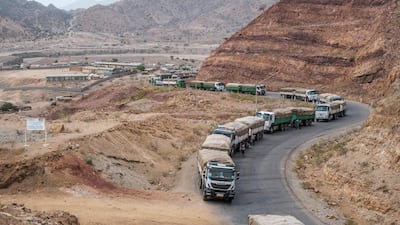Allies of Ethiopia’s federal military are looting property and carrying out mass detentions in Tigray, witnesses and aid workers have said.
The accounts raise fresh concern about alleged atrocities more than three weeks after the warring parties signed a truce that diplomats and others hoped would bring an end to suffering in the embattled region that is home to more than 5 million people.
Tigray is still largely cut off from the rest of Ethiopia, although aid deliveries into the region resumed after the November 2 ceasefire deal signed in South Africa. The limited access is making it difficult for journalists and others to obtain information as Ethiopian forces continue to assert control of the region.
Eritrean troops and forces from the neighbouring Ethiopian region of Amhara — who have been fighting on the side of federal military in the Tigray conflict — have looted businesses, private properties, vehicles and health clinics in Shire, a north-western town that was captured from Tigray forces last month, two aid workers there told the Associated Press, speaking on condition of anonymity because of safety concerns.
Several young people have been kidnapped by Eritrean troops in Shire, the aid workers said. One said he saw “more than 300” youths being rounded up by federal troops in several waves of mass detentions after the capture of Shire, home to a large number of internally displaced people.
“There are different detention centres around the town,” the aid worker said.
The troops were arresting people believed to be associated with the Tigray People’s Liberation Front, or TPLF, the political party whose leaders led the war against the federal government.
Civilians accused of aiding Tigray forces are being detained in the southern town of Alamata, according to a resident who said Amhara forces had arrested several of his friends. A former regional official said Amhara forces were also carrying out mass arrests in the town of Korem, about 20km north of Alamata, and in surrounding rural areas.
Both the Alamata resident and the former official requested anonymity because of safety fears as well as fear of reprisals.
The continuing presence of Eritrean troops in Tigray remains a sore point in the ongoing peace process and the US has called for their withdrawal from the region.
The military spokesman and government communications minister in Ethiopia did not respond to a request for comment, nor did Eritrea’s embassy in Ethiopia.
Eritrea, which shares a border with Tigray, was not mentioned in the text of the ceasefire deal. The absence of Eritrea from ceasefire negotiations had raised questions about whether that country’s repressive government, which has long considered Tigray authorities a threat, would respect the agreement.
A subsequent implementation accord, signed by military commanders in Kenya, stated that the Tigray forces would disband their heavy weapons “concurrently with the withdrawal of foreign and non-[federal] forces from the region”.
Yet aid officials, diplomats and inside sources say Eritrean forces are still active in several areas of Tigray. Eritrean troops have been blamed for some of the worst abuse in conflict, including gang rapes.
Tigrai Television, a regional broadcaster based in the Tigrayan capital of Mekele, reported on November 19 that Eritrean soldiers had killed 63 civilians, including 10 children, in an area called Egela in central Tigray. The report cited witnesses including one who said affected communities were being prevented from burying their dead.
Ethiopian Prime Minister Abiy Ahmed and US Secretary of State Antony Blinken discussed the importance of implementing the peace deal, “including the withdrawal of all foreign forces and the concurrent disarmament of the Tigray forces” in a phone call on Monday, State Department spokesman Ned Price said.
Four youths were killed by Eritrean forces in the north-western Tigray town of Axum on November 17, a humanitarian worker told AP. “The killings have not stopped despite the peace deal,” said the humanitarian worker, adding that the violence was "being carried out in Axum exclusively by Eritrean forces".
A statement from Tigray’s communication bureau last week said Eritrea’s military “continues committing horrific atrocities in Tigray”. It accused Eritrean President Isaias Afwerki of “bringing more units into Tigray though [he is] expected to withdraw his troops” after the ceasefire deal.
The brutal fighting in Tigray, which spilt into the Amhara and Afar regions as Tigrayan forces pressed towards the federal capital last year, was renewed in August after months of lull.
Tigray is in the grip of a dire humanitarian crisis after two years of restrictions on aid. The restrictions prompted a UN panel of experts to conclude that Ethiopia’s government probably used “starvation as a method of warfare” in the region.
Ethiopian authorities have long denied targeting civilians in Tigray, saying their goal is to apprehend the region’s rebellious leaders.
Despite the African Union-led ceasefire, basic services such as phone, electricity and banking are still switched off in most parts of Tigray. The US estimates hundreds of thousands of people could have been killed in the war marked by abuse on all sides.
The ceasefire deal requires federal authorities to enable “unhindered humanitarian access” to Tigray. The World Food Programme on Friday said it had sent 96 lorries of food and fuel to Tigray since the agreement, although access to parts of central and eastern Tigray remained “constrained".
Unhindered access into Tigray has not yet been granted despite the number of lorries going into the region, with some restrictions remaining in place, an aid worker said on Friday. There are limits on the amount of cash humanitarian organisations can take into Tigray, while checkpoints and military commanders impede the movements of aid workers within the region, the aid worker said.

